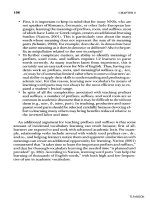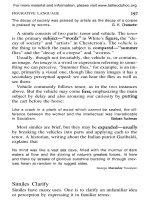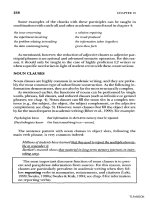EVERYDAY WRITING - Express yourself pptx
Bạn đang xem bản rút gọn của tài liệu. Xem và tải ngay bản đầy đủ của tài liệu tại đây (84.98 KB, 6 trang )
CHAPTER
EVERYDAY
WRITING
THIS CHAPTER explains some of the everyday
purposes that apply to reading and writing for
information and understanding. You will learn
how to apply the skills you have just learned to
write business letters, directions/instructions,
and general summaries.
ust how does writing which seems so geared to school have any connection to your everyday life? You
may even be thinking that once you’re out of school you’ll never have to write again. Well, that’s sim-
ply not the case. With e-mail developing as a primary means of everyday communication, writing to
communicate information and demonstrate understanding is of major importance.
This is especially true as you enter the business world and hope to climb the corporate ladder. Remem-
ber what we said at the very beginning of this book? “Writing is the way we make our thinking visible to the
world.” Consider then the likelihood that your boss or business manager would want to promote you to a
leadership position if he or she hasn’t seen a particularly clear and organized mind. And we’re not talking
about waiting until you’re out of college or graduate school. Even if you’re just working your way through
27
THREE
EVERYDAY WRITING EXPRESS YOURSELF
J
J
school waiting until you can finally land the job of your dreams, your writing can establish you as a compe-
tent, confident individual worthy of responsibility.
Here are some of the most important characteristics of business writing in general, and e-mail in par-
ticular:
➡ Know your audience.
➡ Anticipate your audience’s needs and questions.
➡ State your main idea in the opening sentence.
➡ Be brief. Avoid wordy, repetitive writing.
➡ Avoid slang, buzz words, jargon, and colloquialisms.
➡ Never include jokes, clichés, and ethnic references.
➡ Be factual, not emotional.
➡ Focus on the positive by choosing positive words and phrases.
➡ Always proofread to be sure that you have followed the conventions of standard written English.
Even in e-mail: correct grammar— including capitalization and diction—apply.
Let’s look at each of these and see how they actually affect business writing. First, the concept of know-
ing your audience is important no matter what your purpose for writing. In the case of the business memo
or letter, knowing your audience will determine how much information you need to provide, and what spe-
cific questions and/or needs will have to be addressed. For example, your manager has asked that you e-mail
the other employees about the annual Memorial Day picnic. You could write:
To: Everybody
From: Chuck
Re: Our annual picnic
The Memorial Day picnic is going to be at Sherwood Park on Monday. Mark Manager
asked me to invite you guys.
Bring burgers and stuff and get ready for a blast!
See ya
The response to your e-mail is slow and steady. You are asked by all of the people you e-mailed what
time they should come and what they should bring other than their own burgers. Or did you mean that every-
one should simply supply everything, including soda and chips and paper goods. And exactly what did you
mean by a blast? Last year there was an organized volleyball game. Is that happening again this year? Should
they bring volleyballs? You know all the answers and by the time you have recited them all for the fourteenth
time you are behind in your work and not at all sure if anyone will actually attend the picnic. Mark Manager
isn’t too happy with you either. He’s heard from several people that the e-mail he sent was confusing. Appar-
ently, some people assumed that it was his invitation because he’s the boss.
So what went wrong? First, you wrote for an audience that you assumed had the same background infor-
mation that you did. They were all there last year. Right? Wrong. There were several old-timers who missed
EXPRESS YOURSELF EVERYDAY WRITING
28
last year, and there are at least three new people who had no previous experience. Second, for everyone con-
cerned, dates (not just Monday), times (from 3 to midnight), and location (specific street) would have been
helpful. Third, you said bring “burgers.” Did that mean that the company was providing everything else?
Mark Manager is right to think that you didn’t give much thought or planning to this task. So he re-
wrote the memo.
TO: All employees, families and friends
FROM: Mark Manager
RE: Annual Memorial Day Picnic
Please plan to attend our Memorial Day Picnic on Monday, May 25th, at Sherwood
Park from 3PM to midnight. A direction map is attached for those of you who are
new to our company.
We’ll provide all the beverages and paper goods but the food is up to you. Please
bring enough food, snacks, et cetera for your own group. As always, family and
friends are welcome.
We need a head count, so let me know by Friday, the 22nd how many you’ll be
bringing.
We will have our annual volleyball tournament! Come ready to have a good time!
Notice that Mark Manager will not have to take time away from the important work of everyday busi-
ness—where time means money and productivity—to answer questions. His memo anticipated and answered
the most important questions.
Another example of everyday writing that you might confront is the message to your teacher or school
district administrator requesting resolution to a complaint or requesting information. For example, Sally Stu-
dent was very unhappy with her final grade in science. She spoke to her teacher but someone told her that
when you put something in writing it is always taken more seriously. Thus Sally decided to write to Mrs. Biology.
Dear Mrs. Biology,
I really don’t think my grade was fair and I want you to recalculate it and change it if you can.
Thanks a lot.
Sally
Mrs. Biology receives this letter and wonders:
➡ Sally who?
➡ What class was she in?
➡ What grade is she complaining about? Was it the final exam or the final grade?
EVERYDAY WRITING EXPRESS YOURSELF
29
➡ What does she expect me to do?
➡ Boy, does this student have an “attitude.”
When Sally gets no response, her friend who got an A+ in English, helps her re-write the letter.
1010 Grade Point Avenue
Transcript City, New York
June 15, 2001
Dear Mrs. Biology,
I was a student in your Biology 103 class this past semester. When I received my final grade of C+ I was
very disappointed. I had expected a B. I calculated my grades as follows:
mid-term 87
term paper 89
quizzes 83
final 77
I believe that each grade was 25% of the grade so averaged out that would have been an 84 or a B.
I would appreciate it if you would get back to me as soon as possible and let me know if a mistake was
made.
Thank you,
Sally Student
An e-mail would have been similar in format, but the heading would have been different:
TO: Mrs. Biology
FROM: Sally Student
RE: Final Grade
DATE: June 3, 2001
I was a student in your Biology 103 class this past semester. When I received my
final grade of C+ I was very disappointed. I had expected a B. I calculated my
grades as follows:
mid-term: 87
term paper: 87
quizzes: 83
final: 77
I believe that each grade was 25% of the final grade so averaged out that would
have been an 84 or a B.
EXPRESS YOURSELF EVERYDAY WRITING
30
I would appreciate it if you would get back to me as soon as possible and let me
know if a mistake was made.
Thank you,
Sally Student
Whether e-mail or snail mail (a slang term for regular mail), the revisions accomplished three very
important goals of good business writing: tone, clarity, and expectation.
TONE
Mrs. Biology was right to question Sally’s “attitude.” In the first memo Sally was accusatory. It is clear she
thinks Mrs. Biology made a mistake and she is essentially demanding that Mrs. Biology correct it. In both
revisions, the accusation is gone and a question replaces it. Was an error made and could it have been Sally’s?
This leaves Mrs. Biology the opportunity to correct Sally’s or her own mistake without being defensive.
Word choice creates positive tone. See if you can tell the difference between these sentences.
You made a mistake. An error has been made.
You failed to appear. You weren’t present.
That’s going to be a problem. That will be a real challenge.
You didn’t include your check. Your check was not included.
Turn in your paper on time. Papers are due on Monday.
In each of the above pairs, the sentence in the right hand column is more positive than its counterpart
in the left hand column. You may think this is only playing with words, but word choice conveys attitude.
You never want to create a negative attitude when you want something accomplished. In the first pair, the
word “mistake” is more negative than the word “error” and declaring that “you” made it is an accusation. On
the other hand, saying that an error “was made” leaves out the blame.
In the second set, the word “failed”is replaced with “weren’t present.”No one likes to be told they “failed”
anything. In the third, “problems” always sound insurmountable and difficult. “Challenges” imply satisfac-
tion and accomplishment. In the fourth, rather than saying “you” didn’t do something, the burden was shifted
to the check. Again, the reader doesn’t feel personally attacked. In the fifth, the command to turn in your
paper was softened by making the request more general.
Word choice and word order are the key elements in creating positive tone. See what you can do to re-
write and improve the tone of the following:
1. Send an application immediately.
2. You have not sent the college catalog I requested.
EVERYDAY WRITING EXPRESS YOURSELF
31
3. I expect that you will correct the mistake on my transcript.
4. You are expected to be in class on time and prepared to work.
5. All employees must be dressed in clean clothes.
See page 147 for suggested answers.
CLARITY
Clarity is simply making sure that the problem is clearly presented. That usually means including those famous
5 w’s: who, what, when, where, why, and how. Going back to the revision of Sally’s letter, she gives Mrs. Biol-
ogy enough information to identify her, her class, her numerical grades, and how she calculated the final grade
she expected. She anticipated Mrs. Biology’s needs—she saved her time and made it easier for her to respond
to Sally quickly and correctly.
E
XPECTATION
Sally has also made clear what she expects to happen as a result of her request. She expects to receive an answer
and possibly a recalculation of her grade. Furthermore, she has provided her street address or her e-mail
address for Mrs. Biology.
Tone and clarity are very important elements in good business writing. Whether you’re asking for infor-
mation or for help of any kind, you must be polite, direct, and clear.
Following is a list of everyday purposes for writing. Try writing these letters and e-mails.
1. Write a letter to your building principal inviting him to be a guest speaker in your economics class.
Remember the 5 w’s.
2. Write an e-mail to your English teacher asking for help with an assignment. Be specific about what
you need to know. You can make up an assignment appropriate to your grade or subject.
3. Write a letter responding to an ad in the paper for an after school job at a local store. Make up a store
where you’ve always wanted to work.
4. Write directions to your house for a friend who will be visiting from school. Remember, he’s never
been to your house before.
5. You recently purchased a DVD and it doesn’t play. The store told you to “put it in writing.” Write a
letter of complaint.
EXPRESS YOURSELF EVERYDAY WRITING
32









